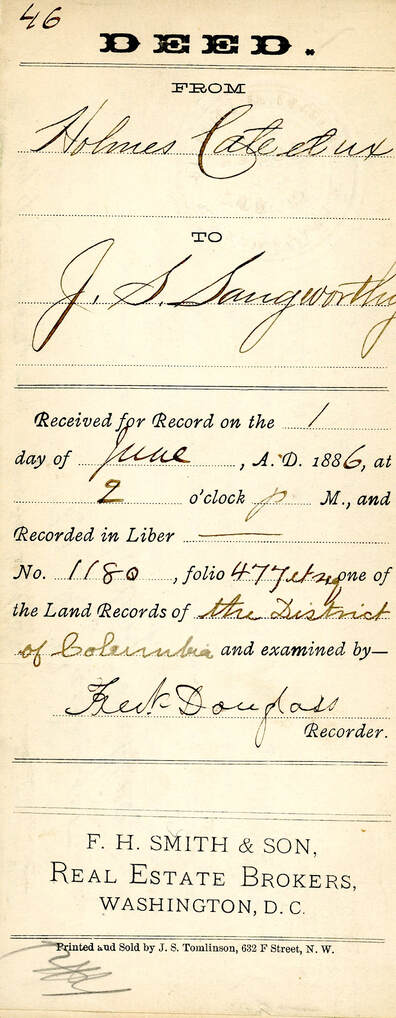PR205
Frederick Douglass Signed Deed
June 2, 1886
He pens his signature on this deed as Recorder in June of 1886! Deed Signed: "Fredk Douglass" as Recorder on docket panel,
Release from "Holmes Cate et ux" to "J. S. Sangworthy". In part: "This Indenture, made this First___ day of ___June___ in the year of our Lord one thousand eight hundred and eighty six between Holmes Cate and Maggie Mc Cate his wife , both of the District of Columbia of the first part, and J. S. Sangworthy, of said District of Columbia ".
In 1881, Frederick Douglass (1817-1895) was appointed the Recorder of Deeds for Washington D.C., a position he served in for five years. He is perhaps the most important civil rights leader in the history of the United States. The man born a slave taught himself how to read and write before he escaped in 1838, travelling from Maryland to Delaware to Pennsylvania, finally arriving at his final destination in New York City, New York.
Douglas spent the rest of his life fighting for an end to slavery and the rights of African-Americans and women to vote. From 1847 to 1851, he published the abolitionist newspaper The North Star. He became known throughout the abolitionist North as a great orator and writer. Perhaps his best-known publication is his autobiography Narrative of the Life of
Frederick Douglass, an American Slave (1845). Douglass's fight for the equality of all races and women continued well after the Civil War; women did not receive the right to vote until the 20th century, and many African-Americans were not allowed to vote until even later.
His home in the Anacostia neighborhood of Washington D.C. was named a National Historic Site in 1988.
Release from "Holmes Cate et ux" to "J. S. Sangworthy". In part: "This Indenture, made this First___ day of ___June___ in the year of our Lord one thousand eight hundred and eighty six between Holmes Cate and Maggie Mc Cate his wife , both of the District of Columbia of the first part, and J. S. Sangworthy, of said District of Columbia ".
In 1881, Frederick Douglass (1817-1895) was appointed the Recorder of Deeds for Washington D.C., a position he served in for five years. He is perhaps the most important civil rights leader in the history of the United States. The man born a slave taught himself how to read and write before he escaped in 1838, travelling from Maryland to Delaware to Pennsylvania, finally arriving at his final destination in New York City, New York.
Douglas spent the rest of his life fighting for an end to slavery and the rights of African-Americans and women to vote. From 1847 to 1851, he published the abolitionist newspaper The North Star. He became known throughout the abolitionist North as a great orator and writer. Perhaps his best-known publication is his autobiography Narrative of the Life of
Frederick Douglass, an American Slave (1845). Douglass's fight for the equality of all races and women continued well after the Civil War; women did not receive the right to vote until the 20th century, and many African-Americans were not allowed to vote until even later.
His home in the Anacostia neighborhood of Washington D.C. was named a National Historic Site in 1988.



